
U.S. Sen. Ron Wyden continues to press federal officials to investigate the retail pharmacy market as customers in Baker City and elsewhere continue to wait for hours to pick up their medications from understaffed pharmacies.
On Tuesday, Dec. 7, Wyden, a Democrat and Oregon’s senior U.S. senator, asked the Federal Trade Commission (FTC) to look into Walgreens’ recent acquisition of Bi-Mart’s pharmacy operations.
That deal resulted in the closure, in early November, of the pharmacy in the Baker City Bi-Mart store.
With many customers transferring their prescriptions to the three remaining pharmacies in Baker City — in the Albertsons, Safeway and Rite Aid stores — lines have been long at times.
In a letter to FTC Chair Lina Khan, Wyden wrote that his “deep concern about the trends unfolding in Oregon lead me to request that the FTC investigate Walgreens’ acquisition of Bi-Mart pharmacies, including the surrounding circumstances. Although these closures represent a local example, as chairman of the Senate Finance Committee, I am concerned that they represent a larger national trend in which a few powerful companies have gained the market power to drive competitors out of business and monopolize the market.”
Wyden has also asked federal officials to review pharmacy closures across the U.S. over the past five years.
Wyden has cited in particular the fees charged by pharmacy benefit managers (PBMs) and by Medicare Part D plans, and their paltry reimbursements to pharmacies.
“Exploitative business practices conducted by pharmaceutical middlemen are driving locally owned pharmacies out of business,” Wyden said. “These practices are not unique to the Pacific Northwest, so I am calling on the FTC to investigate this trend on a national level so action can be taken to protect local businesses.”
Brian Mayo, executive director of the Oregon State Pharmacy Association, also called PBMs a culprit in the pharmacy crisis.
Mayo said the Pharmacy Association has been warning for years that reimbursements are too low.
The organization is calling on elected officials to reform the PBM system and to exempt prescription drugs from Oregon’s Corporate Activities Tax, which the Legislature approved in 2019 and which took effect Jan. 1, 2020.
Mayo said Oregon Gov. Kate Brown’s mandate that health care workers, including pharmacists and pharmacy technicians, be vaccinated or receive a medical or religious exception, has had a “minimal” effect on the current staffing shortages because most affected employees are vaccinated.
According to the Oregon Health Authority, as of Nov. 1, 88% of Oregon pharmacists were vaccinated, and 83% of pharmacy technicians.